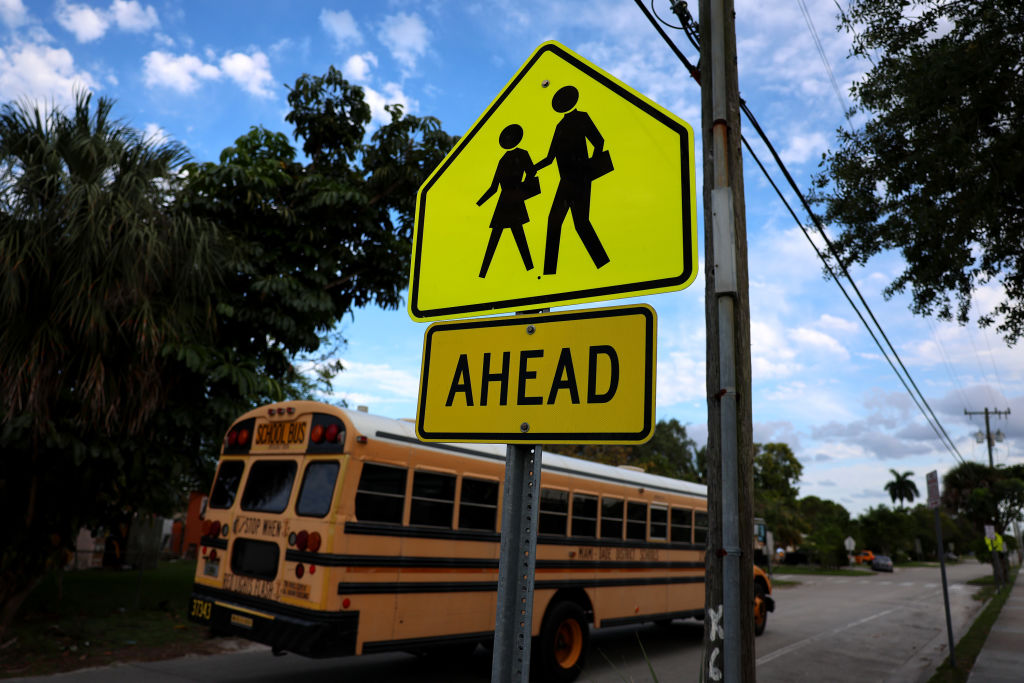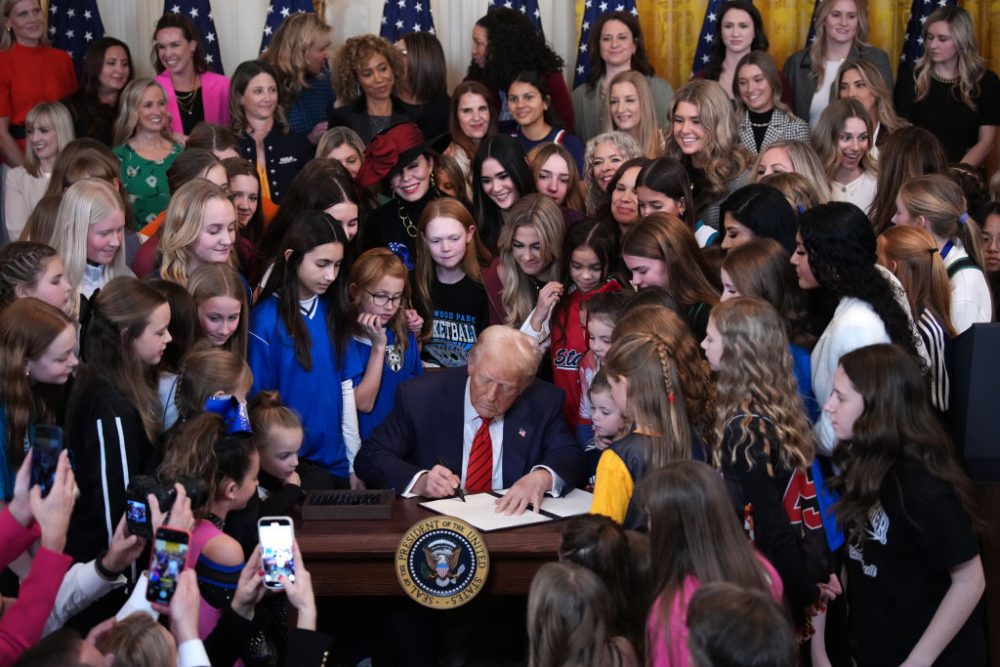Last year’s report card for public schools? A resounding “must do better.” Trans athletes ruined competitive sports, the 1619 Project rewrote American History class and non-gendered bathrooms received their first human litter boxes.
As the final school bells rang on the 2023-23 school year for many Americans, popular opinion of our public schools plummeted. One Gallup poll showed just a quarter of Americans now have either a “great deal” or “fair amount” of confidence in public schooling. That represents a stark downward trend from around 1975 when more than 60 percent were confident in what schools were offering our youngsters. While trust tanked and academics atrophied, spending on education has climbed in direct inverse.
But the scariest trend is hidden a bit deeper in the numbers: schools have evolved to operate as a wing of the left. The trust gap between parties has mushroomed from a paltry 4 percent in 1975 to a staggering 30 percent in 2023. Why? Schools, more than ever, are entrenched in the cultural tug-of-war, defining themselves as the frontline factories forging the cultural warriors of the left.
As a result, the cultural right has begun its exodus with nearly 1.5 million having left since just 2019. But public schools have perverse incentive structures. Losing students isn’t like losing customers — it means nothing. Indeed, as conservatives and independents flee from progressive school districts in droves, they leave schools empowered to push even further left.
So, as we return to school after a much needed respite from big-breasted shop teachers and drag queen story hour, caution is paramount. And for those celebrating minor conservative victories, take heed: the larger educational trendlines are concerning. Here are four predictions for public schools this year:
ESG teacher strikes
Let’s start with the low-hanging fruit. Last year we saw a sharp increase in teacher strikes across the country. Since 2018, teachers have developed something of a hair trigger when it comes to labor disputes with more than 700 strikes in just three years.
Don’t expect that trend to change as UK-based unions have already begun setting the tone during the summer session. Instead, expect to see strikes evolve to mirror their ESG-beholden corporate brethren, as activist teachers begin to push for something they’re calling “common good bargaining.” The new approach to labor disputes adds a whole host of woke demands on top of the typical salary and benefits disputes. As Vox suggests, these common good bargaining demands can include “defunding campus police, offering more eco-friendly and free transportation options, shielding students from evictions, and more.” After all, how can the modern teacher be expected to push on with the weight of climate change hanging around his/her/they/catself’s shoulders?
Parental opacity
Historically, the education system embraced parents as partners. Fast forward to 2023, and the picture is starkly different. With trans rights pushing parents out of the picture, the gateways have opened to a labyrinth of policies that prioritize student autonomy over parental insight.
The policies represent the thin edge of a wedge that drives parents further out of the education system and, often, the lives of their children.
A Rasmussen survey reveals growing parental concern about their waning role in their child’s education, with 84 percent of parents demanding to be involved in matters of curriculum and nearly 80 percent demanding schools involve parents on issues of gender identity. Despite parental unease, districts are doing their best to push parents out. According to one watchdog group, as of the writing of this article 18.285 schools responsible for 10.7 million students have penned policies stating that teachers and staff can or should keep a student’s transgender status from his/her parents.
This shift isn’t just about gender. With an expanding roster of “sensitive” topics, schools are increasingly sidelining parental oversight. It’s not hard to imagine a near future where parents are handed redacted report cards, where parents need “clearance” to attend PTA meetings, or signing a permission slip means agreeing to a blanket non-interference clause.
Decolonized libraries and literature
The library, traditionally a bastion of knowledge and cultural insight, faces an unprecedented overhaul in 2023. Earlier tremors began with the removal of classics like Tom Sawyer due to its racially insensitive content and the Little House series for its portrayal of Native Americans. Now, those tremors have evolved into seismic shifts.
Educators, in their bid to “decolonize” libraries, are purging shelves of not just historically contentious literature, but any work deemed to be from an “oppressive” perspective. This movement extends into literature courses, where the canon has been whittled down to a mere shadow of its former self. Shakespeare? Replaced with postmodern poetry. Hemingway? Superseded by marginalized voices telling the tales of oppression.
Sounds like a dystopian novel, but this is a movement that has momentum. Guidance on “decolonizing” libraries and curricula are popping up everywhere from academia to PBS to librarian reddit. One such guide quotes Lerone Bennett Jr. who said, “an educator in a system of oppression is either a revolutionary or an oppressor,” just before they ask teachers to begin by analyzing “how dominant ideology and white supremacy have shaped our individual beliefs and behaviors.” The threat is real.
The death of gym class
In the hallways of 2023’s educational institutions, there’s a new lesson plan, and it’s a masterclass in irony. As we laud inclusivity, we’re witnessing the slow demise of physical excellence; where every student gets a trophy, but no one’s really winning.
Take women’s sports, for instance. As transgender athletes flood into girls’ sports, real girls are finding the exits. An NPR poll last year revealed waning support for trans athletes with less than a quarter of Americans in support. With the girls being exposed to male genitalia in the locker room and being robbed of a chance to compete, many parents have opted out from school sports entirely.
This muddying of waters isn’t limited to the track or field. Our gymnasiums, once theaters of competition and personal bests, have turned into amphitheaters of the absurd. Dodgeball is now deemed a dangerous game of exclusion, and relay races are too “divisive.” Health classes, under the banner of body positivity, now skirt the hard truths. Lessons on diet and exercise are overshadowed by pep talks on self-acceptance. As we tiptoe around potential feelings of inadequacy, we end up fostering real inadequacy, sidelining the essence of competition and physical improvement.
The 2023 prognosis? The Lizzofication of our youth. Schools seem poised to churn out generations who are experts in excuse-making, but novices in physical health. Fitness isn’t just taking a back seat; it’s being thrown off the bus entirely.
A surface-level inspection of headlines might give us some hope. Trans-athlete bans are passing, a handful of states are pushing for a “parents bill of rights,” and some states are fighting against the Nikole Hannah-Jonesing of our curriculum. But, buried behind those headlines is the real story of a forever-damaged education culture; one that has lost sight of its purpose and reimagined its role from basic educator to cultural engineer.
American parents are voting with their feet as tens of thousands flock to nearby religious schools or find ways to school at home. But for those who remain in public schools, the situation looks even more dire in 2023. As we brace for the school year ahead, it might be time to pack more than just a lunch; perhaps a cultural compass and a grain of salt.

























